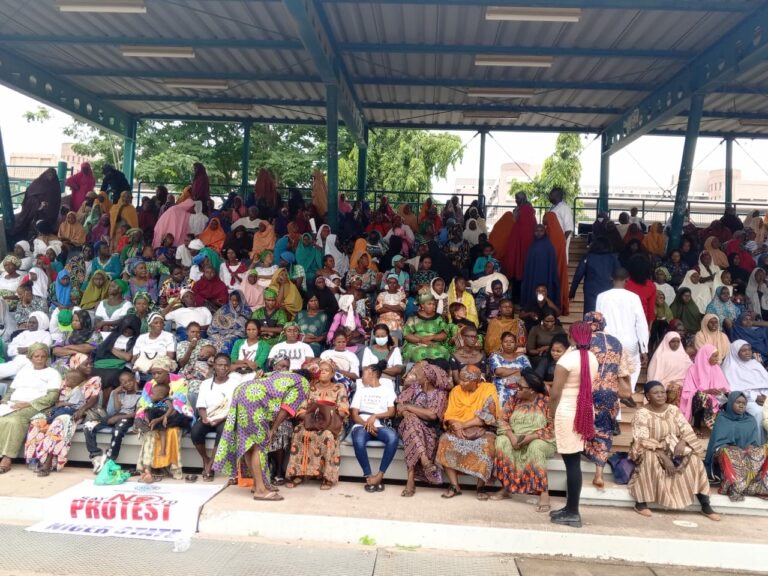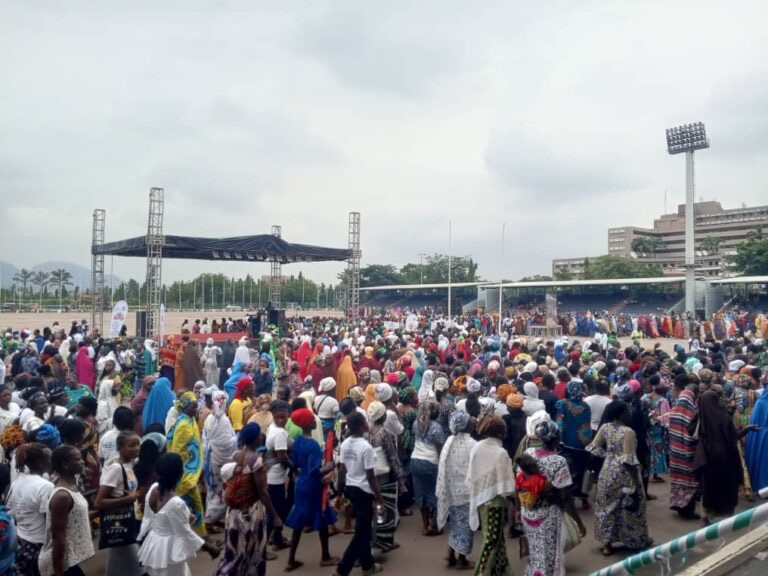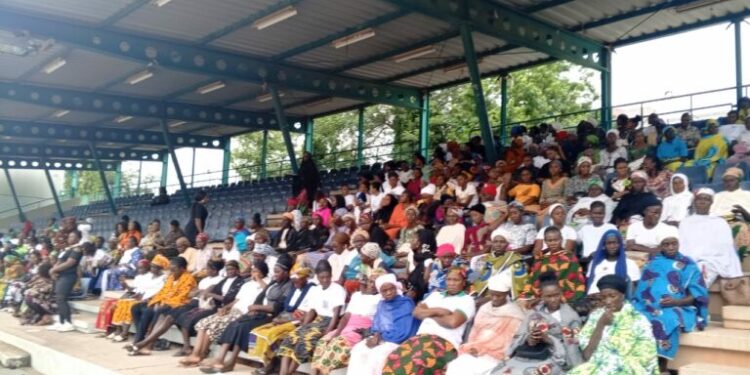Thousands of Nigerian women gathered at Eagle Square over the weekend to oppose the planned August 1st protest. These women, representing various states across the country, expressed their support for President Bola Tinubu’s administration and urged the youth to avoid violent protests.
The rally was organized by the Women for Peace, Security, and Social Inclusion Initiative (WPSSII). During the event, Mrs. Tinu Abiola, the Chairperson of the organization, spoke to the large crowd, emphasizing the dangers of violent protests. She advocated for peaceful dialogue among citizens and stakeholders instead.
Abiola stated, “Violent protests and demonstrations only lead to further division and destruction. They hinder our progress as a nation and undermine the efforts of those striving for positive change. Instead, let us act peacefully, respecting everyone’s rights and dignity. Our actions today will shape Nigeria’s future, and we must ensure we leave a legacy of peace and unity for future generations.”

She warned that violence can undermine the causes people are fighting for, reducing public support and increasing harm to innocent people. According to Abiola, effective advocacy should focus on peaceful, constructive dialogue rather than aggression and destruction. She added that violence often shifts attention away from legitimate grievances, providing an opportunity for opponents to discredit the movement.
Bilkisu Ademola, the National Coordinator of the Northern Women Forum, also spoke about the growing unrest. She urged families to discourage their children from participating in violent protests. Ademola emphasized that violence cannot lead to progress and highlighted the risks of protests being hijacked by troublemakers. She called on the government to take visible and meaningful actions to address public concerns.
Ademola suggested that gradual adjustments to fuel prices and debt servicing could help ease public frustration and stabilize the situation.
Hon. Felix Idowu, Vice President of WPSSII, highlighted the crucial role mothers play in guiding peaceful solutions. He stated, “Dialogue is better than protest. Positive developments such as the signing of the minimum wage and local government autonomy laws show that constructive discussions can lead to progress.” Idowu stressed that structured dialogue is preferable to protests, as it can avoid economic disruptions. He urged the government to quickly set up a committee for discussions, similar to those held with labor unions, to prevent negative impacts like those seen in countries such as Kenya.

Patience Andrew, a banker and financial expert, spoke about the economic risks of prolonged shutdowns. She warned that a ten-day shutdown could lead to significant financial losses, including a daily loss of $5 million in the oil sector alone. Andrew stressed that ordinary citizens would suffer the most from such disruptions and called for dialogue to address economic hardships.
Andrew also highlighted the soaring inflation rate, warning that further disruptions could worsen the situation. She suggested reversing fuel price increases as a step towards stabilization.
Hajiya Salamatu Agum Bala, Leader of Women Link in Nasarawa State, emphasized the need for dialogue to move the nation forward. She urged those planning to protest to give the government time to address issues like youth unemployment, inflation, insecurity, and other socioeconomic challenges. Bala advised women and youths to support President Tinubu’s government in addressing these issues rather than engaging in protests driven by hidden agendas.
She also suggested that the government should support small businesses and farmers to help them grow. Bala noted that, unlike in developed countries where most people work in the private sector, Nigeria’s government cannot employ everyone. She advocated for creating an enabling environment for the private sector to thrive and called for measures to reduce fuel costs, which affect various aspects of the economy, including transportation and agriculture.
In summary, leaders from various sectors are advocating for peaceful solutions and proactive government action to address the root causes of the planned protests, aiming to avoid further economic and social disruptions.


































